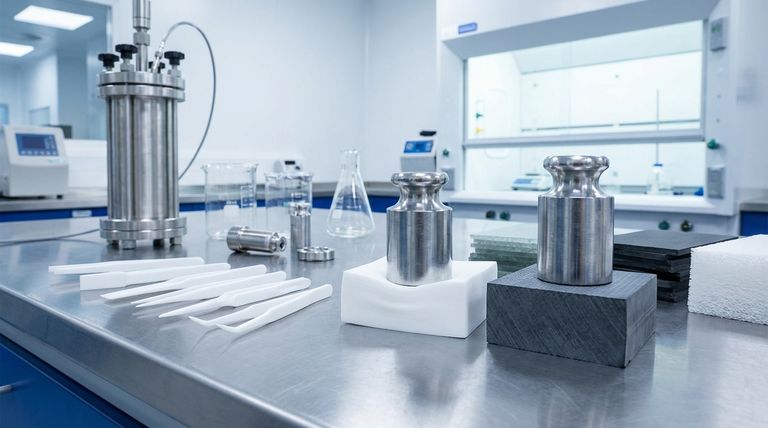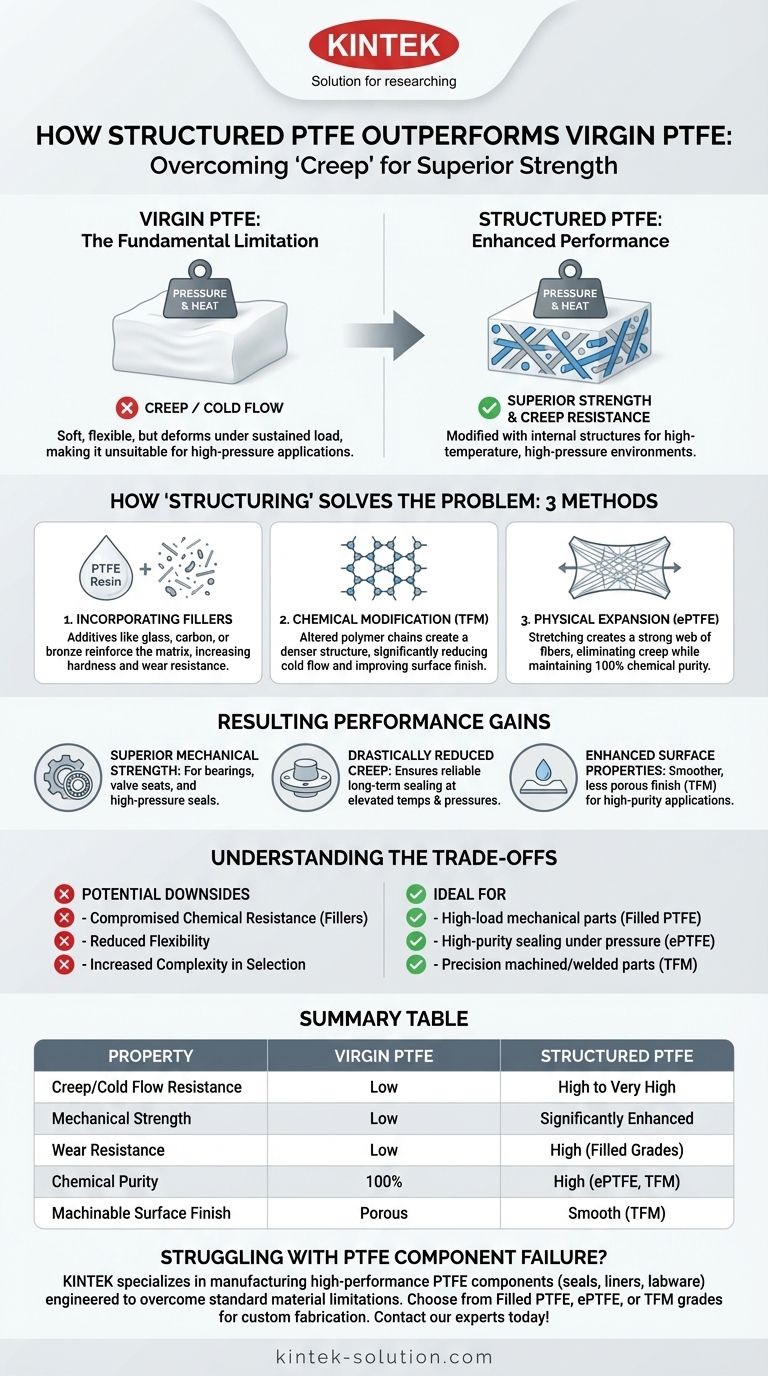In essence, structured PTFE enhances performance by fundamentally overcoming virgin PTFE's primary weakness: its tendency to deform under pressure, a phenomenon known as "creep" or "cold flow." By incorporating internal structures—either through fillers, chemical modification, or physical expansion—structured PTFE gains superior mechanical strength. This allows it to be used in applications with much higher operating temperatures and pressures than its virgin counterpart.
While virgin PTFE is prized for its extreme chemical inertness and low friction, its inherent softness limits its use in demanding mechanical roles. Structured PTFE variants are intentionally engineered to add specific properties like creep resistance and hardness, transforming a soft polymer into a robust engineering material.

The Fundamental Limitation of Virgin PTFE
The Problem of "Creep"
Virgin Polytetrafluoroethylene (PTFE) is a uniquely soft and flexible material. While this is an advantage in some scenarios, it means the material will slowly deform or "flow" when subjected to a sustained load, especially at elevated temperatures.
This "cold flow" or "creep" makes virgin PTFE unsuitable for many high-pressure sealing and structural applications, as the material will not maintain its original shape and sealing force over time.
The Baseline Properties
To understand the improvements, it's important to recognize the exceptional baseline properties of virgin PTFE. It offers a nearly universal chemical resistance, an extremely low coefficient of friction (making it non-stick), and excellent electrical and thermal insulation. The goal of structured PTFE is to retain as many of these benefits as possible while fixing the mechanical shortcomings.
How "Structuring" Solves the Problem
The term "structured PTFE" broadly refers to any PTFE that has been modified to improve its physical properties. This is typically achieved through one of three methods.
Method 1: Incorporating Fillers
The most common approach is to create a filled PTFE. Additives such as glass fiber, carbon, or bronze are blended with the PTFE resin before it is processed.
These fillers act as a reinforcing matrix within the soft PTFE. This dramatically increases hardness, stiffness, and wear resistance, directly combating the material's tendency to creep.
Method 2: Chemical Modification (TFM)
Instead of adding a separate material, the PTFE polymer chain itself can be altered. Modified PTFE, often known as TFM, includes a small amount of a co-monomer like perfluoropropylvinylether.
This chemical modification creates a denser, less porous molecular structure. The result is a material with significantly reduced cold flow (by up to a factor of three), smoother machined surfaces, and the unique ability to be welded.
Method 3: Physical Expansion (ePTFE)
A third method involves physically processing pure PTFE to create a new internal structure. Expanded PTFE (ePTFE) is made by stretching the material in multiple directions.
This process creates a strong, multidirectional web of fibers known as fibrillation. This internal structure effectively eliminates creep and improves compressibility while maintaining the 100% chemical purity of virgin PTFE.
The Resulting Performance Gains
Modifying the structure of PTFE leads to a range of measurable improvements that expand its operational capabilities.
Superior Mechanical Strength
The most significant benefit is enhanced mechanical performance. Filled and modified grades offer far greater resistance to deformation under load, allowing them to be used for components like bearings, valve seats, and high-pressure seals.
Drastically Reduced Creep
By controlling or eliminating creep, structured PTFE gaskets and seals maintain their integrity at higher pressures and temperatures. This ensures a reliable, long-term seal where virgin PTFE would fail.
Enhanced Surface Properties
Chemically modified PTFE (TFM) can be machined to a much smoother finish than virgin PTFE. This smoother, less porous surface is less likely to trap contaminants, making it ideal for high-purity applications in the semiconductor and pharmaceutical industries.
Understanding the Trade-offs
Choosing a structured PTFE involves balancing benefits with potential downsides. No single variant is perfect for every situation.
Compromised Chemical Resistance
While pure PTFE is inert to nearly all chemicals, the additives in filled grades may not be. For example, glass-filled PTFE can be attacked by hydrofluoric acid or strong alkalis, a vulnerability virgin PTFE does not have.
Reduced Flexibility
The same modifications that increase stiffness and hardness naturally reduce the softness and flexibility characteristic of virgin PTFE. This can be a disadvantage in applications requiring the material to conform to highly irregular surfaces.
Increased Complexity in Selection
The wide array of fillers and modification methods means that selecting the correct grade requires a deeper technical understanding of the application's specific demands—including chemical exposure, temperature, pressure, and mechanical stress.
Making the Right Choice for Your Application
Your final selection should be driven entirely by the primary demands of the intended use case.
- If your primary focus is maximum chemical inertness and flexibility: Virgin PTFE remains the ideal choice for applications like lab equipment linings where mechanical load is minimal.
- If your primary focus is high-load mechanical components: A filled PTFE (e.g., carbon or glass-filled) offers the necessary wear resistance and hardness for seals, bearings, and structural parts.
- If your primary focus is high-purity sealing under pressure: Expanded PTFE (ePTFE) provides excellent creep resistance and conformability without introducing filler contaminants.
- If your primary focus is precision machined parts or weldability: Chemically modified PTFE (like TFM) delivers a smoother surface, stronger properties, and allows for fabrication techniques not possible with other types.
By understanding these distinctions, you can select a PTFE variant precisely engineered for the mechanical and chemical demands of your project.
Summary Table:
| Property | Virgin PTFE | Structured PTFE |
|---|---|---|
| Creep/Cold Flow Resistance | Low | High to Very High |
| Mechanical Strength | Low | Significantly Enhanced |
| Wear Resistance | Low | High (Filled Grades) |
| Chemical Purity | 100% | High (ePTFE, TFM) |
| Machinable Surface Finish | Porous | Smooth (TFM) |
| Ideal For | Low-load chemical linings | High-pressure seals, bearings, structural parts |
Struggling with PTFE component failure under pressure?
At KINTEK, we specialize in manufacturing high-performance PTFE components—including seals, liners, and labware—precisely engineered to overcome the limitations of standard materials. Whether you need the mechanical strength of filled PTFE, the high purity of expanded PTFE (ePTFE), or the superior machinability of modified PTFE (TFM), we provide custom fabrication from prototypes to high-volume orders for the semiconductor, medical, laboratory, and industrial sectors.
Let us help you select the perfect PTFE grade for your application's specific demands. Contact our experts today for a consultation!
Visual Guide

Related Products
- Custom PTFE Parts Manufacturer for Teflon Parts and PTFE Tweezers
- Custom PTFE Parts Manufacturer for Teflon Containers and Components
- Custom PTFE Sleeves and Hollow Rods for Advanced Applications
- Custom PTFE Measuring Cylinders for Advanced Scientific and Industrial Applications
- Customizable PTFE Rods for Advanced Industrial Applications
People Also Ask
- How does PTFE contribute to low friction and wear resistance? Achieve Superior Performance with Advanced Materials
- What are the main advantages of using PTFE parts in industrial applications? Unlock Unmatched Chemical Resistance and Reliability
- Why is PTFE rod suitable for automotive applications? Boost Vehicle Performance & Durability
- Why is CNC machining preferred for Teflon parts over other methods? Unlock Precision & Complex Designs
- What are the best practices for achieving tight tolerances in Teflon (PTFE) machining? Master Precision for Demanding Applications



















